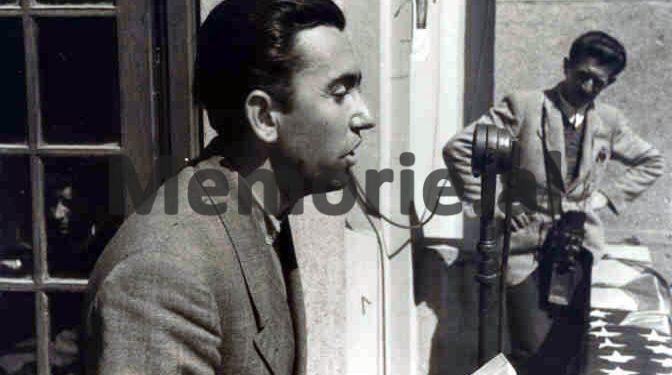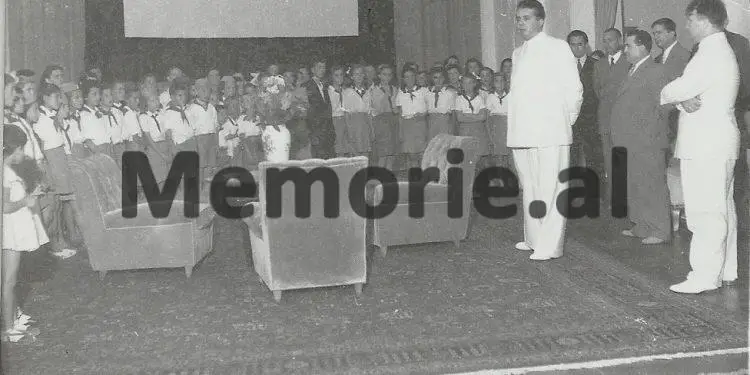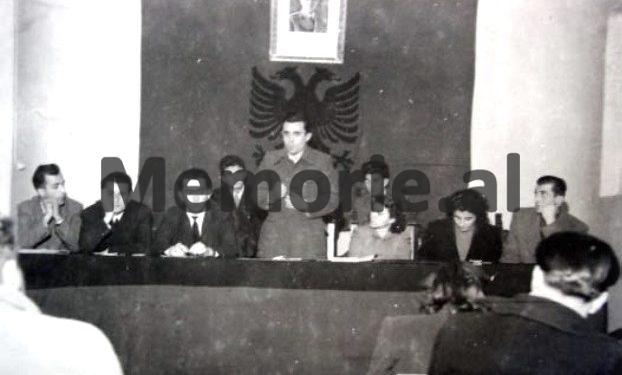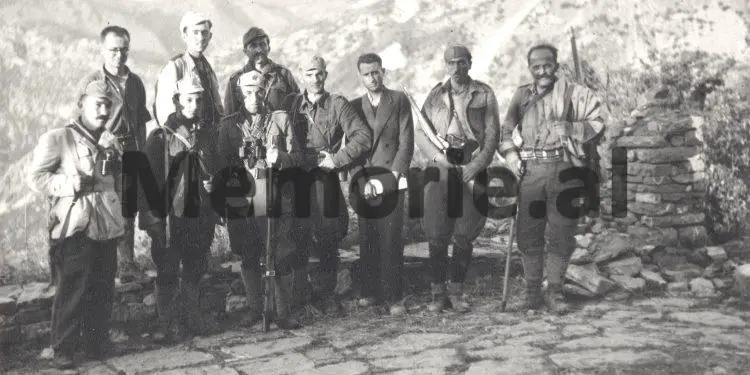By Fadil Paçrami
Second part
Memorie.al / What is prison? It is the place where those who have been sentenced to deprivation of liberty are kept, we would say by reading any dictionary. But that is little. Prison and freedom – two opposites. Previously: what is freedom? In short: to be free means to do what you want, to think and act as you wish in the exercise and fulfillment of your freedoms and rights, as a person and as a citizen, but always without harming and violating others. . Again: to think and act. We are talking about democratic freedoms, from those of speech, press, assembly and organization in various parties and associations, ensuring the conditions where ideas, requests and human wills can find expression and concretization, from those of the biological-related plan with the being itself, to those of the social plan, related to the ways of living.
Continues from last issue
My discussion in the basic organization of the party, after the conversation of March 30, 1973 with Enver Hoxha
– What I said above is also related to some issues of the People’s Theater and the Opera and Ballet Theater. In these institutions there are internal things, personal quarrels, pettiness and confusion among them; there is also the issue of understanding the developments in these fields. Not dealing with the former – and I did not deal with them, but they should not be underestimated – I say that the conflict that has been going on for a long time in the People’s Theater has expressed, as well as in other areas, that war that has been waged openly once closed, to move forward, to rise to higher levels, the fight for a more realistic and professional theater, to perform on stage works with complex characters, even in our days.
I expressed myself and fought for a theater where all its components work together: dramaturgy, directing, acting, scenography, etc., without fluff and some debris of that theater, from which we have not yet separated, that it plays with small feelings and tries to create momentary emotions, where an unrealistic, pompous and dialectical game stands out, which carries as a legacy from previous dilettante theatrical and literary movements. In this matter, I think I was not wrong… my statement on one occasion that; this is a play like that of the “Bogdan” theater, said 5-6 years ago, when rehearsals were being made for a piece that failed completely, some actors were touched at that time, who blew it then, yes, but there is also a lot of speculation today too.
My persistent effort to rejuvenate the troop, bringing in new forces, as well as to relieve it because there are many people sitting idle, some even of a profile, has irritated some of them, creating some discomfort, is professional character…! The conflicts in the Opera and Ballet Theater also have this color.
– There is also something I want to emphasize, it is worth it: the confusion in the functions of the secretary of the party, with being a creator, because it happened that I spoke as a creator, when I had to take the position of the secretary of the party, or act as if I took the position of party secretary, when I was simply expressing my opinion as a creator. It has often happened those cultural and artistic institutions and their management staff and specialists have entered into a relationship with me and I with them as a creator consulted on creative issues and asked for opinions on works, librettos, repertoires, etc.
I have spoken with them and expressed my opinions often since the initial stages as a creator and colleague, but it happened that they were taken and, it was said later, that the party secretary knows this or has approved them. It has also happened that I, as a writer, have had my preferences for this or that type of creativity, say in the theater, and with the interventions I have influenced, as it has also happened that they have shown weakness, from the sentimental positions of the creator, towards any the specialist cadre or any element with talent, saying a good word, or making a professional evaluation for him, but these are taken as the positions of the party secretary.
In the same way, the trust I have expressed towards the culture specialists, entering into direct relations with them, has made me listen to their voice more than everyone else’s, so that I maintain more connections with the specialists than with the grassroots organizations of the party or other governing bodies. At the same time, entering such paths, I entered into social relations with some of them, which led to familiarity, which appeared with the protection, sometimes even excessive, that I did to them, what he also pushed them into mistakes, benefiting from my support.
In conclusion, I wanted to say these few words; I have worked unsparingly and openly, boldly saying what I had in my head. As it seems, despite all the extensive experience in the party, I remained an intellectual without some weaknesses, typical of intellectuals. This is me and this is where I am now. My life as a cadre of the ideological front does not end here.
Tirana, 6.4.1973.
THE BEGINNING OF THE END…
(See with)
The 4th Plenum of the Central Committee that was held on June 26-28, 1973, is known as one of the ominous events that deepened the processes towards a tougher course of the ALP, with serious consequences in the life of the country. Much was said about him at the time, and later, presenting him differently than he really was. Below, I try to give some personal thoughts and considerations in the form of notes, without any claims, because there is a lot to say about it, seeing and evaluating the causes, goals and consequences, with a realistic and objective eye.
Much has been said about the 4th Plenum, but not the truth. The report was held by Enver Hoxha, something rare, since as a rule, he made the conclusions at the end. He therefore gave it a special importance. Why? The reasons became clear from that time, even more so in the years that followed. With a direct and brutal intervention, he set in motion the plan to face the crisis that had overtaken the country, further tightening the screws and pulling the brakes hard, so that power would not slip from his hands.
The atmosphere that dominated those three days was heavy. The speech of March 15 of that year had raised tensions everywhere like rarely. For three months, consecutive meetings of basic organizations were held, discussions were nervous and noisy, and the press undertook an unprecedented campaign against “foreign shows”, deviations from the line in literature and the arts, as well as youth fashions. All of these preceded and prepared, all of them spoke against liberalism and bourgeois-revisionist influences, anathemas to their phenomena, in different sectors-fields and the blaming of specific persons. Fadil Paçrami and Todi Lubonja were called carriers and instigators of such trends.
There were also accusations of; dangerous “hostile activities”, to the detriment of the country and in the service of foreigners. Fairy tales, a quixotic war all. Noise and smoke, to cover and hide the truth. A futile attempt to prolong the life of the dictatorship, sinking even deeper into its mire and using more extreme means of oppression. Time, subsequent developments, during two decades – the 70s-80s, showed this best. In the plenum, as had been done before, this time even more, there were no analyses, clarifications and discussions to be. These were not recognized and practiced because they were not accepted at that time, in the life of the party and the country, even less in the Central Committee.
Even though they said all those things, they made so many accusations against me and Todd, we weren’t even allowed to explain ourselves. When we got the floor to discuss, she cut us off two or three times, without letting us continue until the end. I remember like today, how I started to speak in the introduction, recognizing that mistakes at work happen and everyone can make them, no one is exempt from them, that among intellectuals, these are even more possible, just remember How many times did Lenin himself, without criticizing, even harshly, Maxim Gorkin, ironically intervened and Enver Hoxha interrupted me: – “Oi, he wants to equate himself with Gorkin”!?
Of course, it created hilarity in the hall. I refrained and did not add: neither with Gorky nor with Lenin, but I was satisfied with this: – there is no occasion to make comparisons. Eh, there was no room for jokes with dice and I continued. After a while he interrupted me again; “Self-criticism, the plenum requires self-criticism from you, but as far as I can see, you have no intention”! I did not answer and continued: now I will talk about my thoughts and views, related to literature and arts, if these are wrong, I was wrong; if not, I’m not wrong…! Here all the anger erupted.
“Enough! Sit down! We’re not here to hear what you think, go…”! Add some more, who remembers them. So it was with Todd. These angered him even worse and this was clearly seen in the speech he gave at the end. But here it is not about us, each other, that we suffered at that time, as it is not about any plenum, everything speaks of something wider, deeper and more. In two words, I would call it: the beginning of the end. It’s not up to me; I think, to talk about today, what that plenum was and what it represents. Analyzes about the time, the dimensions it took and the consequences, need more complete and documentary data, than the memories and considerations of specific people can provide.
However, something in summary as much as the country allows me, I am expressing an opinion, as far as I know and I have lived. First; I say that they do not hold all that was said at that time, relapses of which, I see repeated in one form or another even today, even adding some preconceived distortions, which increase ambiguities, confusion and distort the essence.
It was not and is not a question of any organized “hostile”, “revisionist”, “anti-national” group, etc., which made so much noise, acting for the interests and service of foreigners, nor for clans. It wasn’t just about literature and the arts, a festival of song and youth fashions, as I tend to narrow it down et several times, in certain districts.
Staying in these coordinates means staying away from the legends, as Enver Hoxha built them. That this happened after ’73 is also explained, although not justified and not forgivable. But to remain silent even today, from those who yesterday were so zealous and servile, as to try to clothe with theoretical principles and theses, that crazy war against “liberalism” and other “isms”, as influences from outside , is amoral. And to continue to make other deformations, based on personal party interests and goals, is unforgivable, doubly amoral. Then how?
To see the events, all that happened and flowed afterwards, as they really were with the eyes of the analyst and the historian, but also the politician with a horizon and dedicated, to say things, as they were, – this is necessary today .
Secondly; a few words now about what was the 4th Plenum in the complex, why did I call it: the beginning of the end?! At that time, the country had entered a crisis and was looking for a way out, from which let us distinguish: the crisis of the system. In the early 1970s, after a long flirtation with the ideas of socialism and the first failures, the ideas of freedom and human rights gained popularity in the last decades, which led to the Declaration of Helsinki and the CSBE – in, the foundations of totalitarianism began to shake, in all the countries of the East, including in us. This process had started in the mid-50s, but in Albania which was restrained by repressive means.
But now it was no longer maintained, even though, apart from force, other demagogic tools were used, up to nationalism and national pride, related to the country’s political, economic and cultural independence.
The crisis of the regime
At the same time, the consequences of the isolation from the West and the East began to be felt more and more, and the signs of divorce with China began to appear, which became visible after the “table tennis diplomacy” and Nixon’s visit to Beijing. At the first signs, measures were taken to block their way, as far as possible, but in vain. There was no escape. There was a lack of clarity, skills and will. Not only had these, but the tendencies to continue and strengthen the dictatorial regime prevailed. A haughty conceit also acted, it was thought that after some achievements in industry and agriculture, I can walk with our feet. So, the slogan was emphasized and took precedence; “with its own forces”. However, the calculations were done wrong. Time showed this in the clearest way, and very quickly.
The crisis of society
After 25 years since liberation, the composition and social structure of the country had undergone profound changes. The layer of the bureaucracy in power had become ruling and had created the privileges of a higher well-being for themselves, while the broad mass of the lower strata of the city and the countryside, as a result of extreme centralism, high accumulation, low wages low and suppression of the individual’s initiative in productive and service activities, they did not advance in terms of living standards.
At the same time, a layer of intellectuals was created and claimed for a wider and free breath, which, on the one hand, saw the slowness in the development of the country; on the other hand, even with such limited contacts with the world, he became aware day by day more that something was wrong, so something had to be changed. This was also the case with the educated youth of the city and the countryside, especially the student youth.
The political and institutional crisis
Political: in the external one, with the world ignoring us and freezing relations with other countries; also in the internal one, with the increase of dissatisfaction and reactions to oppressive measures, with the absurd forms that the so-called class war took.
Institutional: with the dimensions that bureaucratism took, the templates and routine in all areas, the rigidity of the laws and the numbness of the legislative, executive and judicial bodies, the inability to cope with the problems that life brought out in development, related to solving the problems of citizens, tended more and more towards the use of violence, lack of tolerance, not listening to the voice from below, the domination of the orders and wills of the rulers from above, down to the lowest links.
The economic crisis
With the increasing difficulties in economic relations with abroad and those of export – import, in the conditions of the block economy, the market and the competition, the gradual reduction of aid from China, the non-harmonious developments of the economy, with the ambitions to create the basis of a heavy industry, in the conditions of a small country, extreme collectivization in agriculture, preservation of a backward technology, etc. Acute problems were created, both for exports and imports, for production and consumption, for both industry and agriculture.
All these were asked to be solved with centralizing and coercive measures, it was not thought or allowed to act, with the setting in motion of the economic levers, since the production of handicraft, peasant’s yard, services, market, etc.; on the contrary, the latter narrowed even further. The number of non-profitable enterprises increased, the supply of the population became difficult and there were shortages, the sources of income for the state itself and those for families narrowed, prices were maintained thanks to the reduction of demands, and so on.
The intellectual and cultural crisis
The mass arrival of new intellectual forces, in many fields, such as: pedagogues, doctors, lawyers, creators in literature and arts, engineering-technical, economists, agronomists, etc., brought out skilled and talented people, who did not they found ground and conditions for development, were suppressed, oppressed, even extinguished and died, under the weight of selections of marginalization, on the basis of biographies, nepotism, provincialism, and friendships.
These began to be felt more and more, the complaints and protests of the repressive measures from above increased, which deepened the intellectual crisis. In the fields of creativity and culture, it was felt even more. The broad mass of intellectuals did not agree, they were for something else, they knew that it could be done differently, but this was opposed by those who were in charge of the country. Something, therefore, was simmering, and sometimes it appeared with antagonisms and conflicts. In the meantime, the demands for more breathing rights and freedom, as well as more culture, increased, but the party-state clearly reacted against them, and the possibilities from the practical side were limited. Then how?
Creators in letters and arts felt the censorship hanging over their heads at every step; they also suffered from self-censorship, which resulted in a decline in quality creativity. In this context, the Fourth Plenum should be seen. He really exploded and hit hard on the ideological front and targeted literature and the arts, because there the signs of the crisis that had started and was growing appeared more clearly, but also that, by hitting them hard, their mouths were closed and they were cut off the momentum of the creators, so as not to influence others, the entire mass of intelligence was also hit; and that it was thought that in this way, the gates could be closed, for the extension of the crisis in other spheres of the social and political life of the country.
Less than a year later, he hijacked the Defense system; after one year also that of Economics; in the early 80s, the whole pyramid was shaken; when the 90s came, everything ended with a complete reversal. Then, what is the IV Plenum? In short, I would call it; strike against a tendency, a protest, a dissidence, of the time towards dictatorship; as a result of the crisis that engulfed the country; a desperate attempt to stop democratic developments, as soon as it was named “liberalism” and with “isms” and other nicknames, the beginning of the end. That’s all I can say in these few notes this time, but I will have the opportunity to talk about other aspects as well. Memorie.al
The next issue follows














